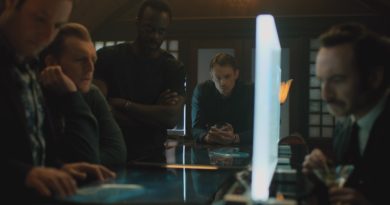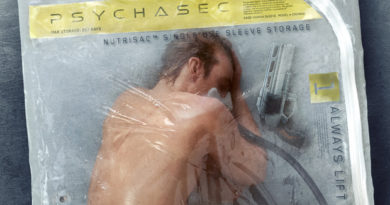Altered Carbon: What’s The Price of Immortality?
Living is costly. But what exactly is the price of immortality in a world where the mind can be preserved indefinitely?
In Netflix’s new sci-fi series Altered Carbon, James Purefoy plays Laurens Bancroft, a handsomely wealthy businessman who is hellbent on solving his own murder. How’s that possible? In the 25th century, humans figured out how to cheat death by downloading their consciousness on “stacks,” which can be placed into new bodies called “sleeves.” Bancroft and his wife Miriam, played by Kristin Lehman, have numerous clones and have lived for more than 300 hundred years. As lead Joel Kinnaman muses in episode two, “You can live forever, if you have the cash.” That kind of life experience could give anyone a God-sized ego.
Last year on the expansive Vancouver set of Altered Carbon, Den of Geek joined a group of journalists for a tour and chat with the cast of the ambitious 10-episode series. We spoke with Purefoy (Hap and Leonard), Lehman (The Killing), and Ato Essandoh (Vinyl) about their characters’ near immortality, the place of religion in this world, and what were some of the hardest scenes to shoot.
Did you guys realize the scope of this project when you signed on? Clearly Netflix is not being cheap here.
James Purefoy: I don’t really do cheap shows. What are you talking about? [laughs] If you try and do this on the cheap, it’s just going to look like shit. You’ve gotta spend the money. If you’re gonna do it, you’re gonna green light something like this, do it properly. What’s the point otherwise?
Ato Essandoh: I just didn’t realize how much money. I mean I knew they had to spend some money, but then I don’t even know the figures, I can’t count that high. The first time I walked on set when I first got here and I saw the street, I couldn’t believe it. And then when I saw it, like I said before, lit with all the extras, all the background players, and it felt like you’re in the world in a way that I’ve not really experienced in my life.
Kristin Lehman: The thing for me that’s very interesting is, yes, I did, because the property itself that they’re basing this on is extremely successful, so from a business perspective it makes sense that they’ve invested in something that is a money maker and is an excellent property. And to know the players that were involved, it meant that, yes, they were gonna really put their money where their mouth was.
I knew that this was going to be one of Netflix’s biggest budget shows, and we’ve all done enough television to know how that looks when you’re filming, what a two million dollar budget feels like, what the pace of a television show feels like when you need to be efficient and lean. And so this really is a bit of a grand experiment, because it’s like filming a giant budget film, but we’re doing a ten to 13 day episode of television.
James Purefoy: I mean when you’re trying to create a world, I think that’s a big deal for me. I mean, I did Rome for HBO and that was a huge world that we were creating there. I mention that only because of the similarity of creating worlds. Worlds in all their authenticity would have different classes, and different kinds of people, and different countries, and different stratas, and when you do that, you have to invest money in something like that, because it’s all about the authenticity of the piece, the world that you live in. And if you don’t get that authenticity right, you might as well just go home.
Kristin and James, you play characters who have been alive for hundreds of years. How did you approach that in your performances?
Kristin Lehman: Well, the world is set up for us, I mean, speaking only for myself. The container’s there, the very clear container of the meth world is there. So that obviously informs the notion of who these people are within that world. And for me, it was really about really grounding into the notion that obviously these people have chosen to live as long as they possibly can. Why might she have decided to live as long as she possibly can? What does that quell for her? What fears does that quell for her? What entitlement does that breed? What corruption does that then also breed?
But also I actually began with the notion that if she’s gonna have decided to have lived that long, she’s firmly planted on earth and feels immovable. And so that was sort of the physical guiding principle for me. And the rest was really about manipulation and entitlement and the corruption that great wealth brings, and the way a hundreds-year-old marriage will fray and dissolve and calcify, and what does that look like? But again, it was held within the container of the world, it was very specific.
James Purefoy: Yeah, I mean I was just really interested in thinking about, and I was spending my time thinking, before we started, a couple of hours before we started, of what it would be like to live to 375 and beyond.
And then you start thinking about the corrupting influence of that, and we were just talking with the other guys about the idea that there is a natural rhythm to life, you’re born, you go to school, you go to college, in the West anyway, and you work for 50 years, and then you retire, and then you shuffle off into the grave.
And what does that mean when you don’t have any deadlines? When you’re not in a hurry, as Ato said earlier, to finish the book that you’re reading? And what does that mean in terms of just the arc of your life that you live? You’re up, down, dead … No, up, up, up, up, and then you just keep going, and the level of corruption that that would bring for you eventually, and how long can you live before the corruption becomes so intense and so calcifying that it destroys your very soul?
Was there a scene that for you guys was really hard to shoot that you had to prepare yourself prior to shooting it?
James Purefoy: There is a scene where I have to take a poker to a clone of myself, so it’s the exact copy of me. And I had to go coco on it with this poker, and blood spraying, and bits of matter and brain matter, and just absolute havoc. And then I take a deep breath, and say something and leave. I found myself curiously calm at the end of the day. It was a really cathartic moment, to destroy myself.
Ato Essandoh: It was a gnarly scene because that was one of those scenes where everybody couldn’t wait to see it, so we all would gather around the monitor while he’s like beating himself, and blood’s going all over the place, and we’re like, “Oh, that’s awful.” Now knowing that you were like, ‘Oh yeah, that was cool,’ that’s a little disturbing.
Kristin Lehman: I feel like as actors we have this really tremendous opportunity to use our work as our own inner work as well. I don’t know very many other professions where if we look at metaphor and meaning and Jungian psychology for example, that I could treat my work like a waking dream and meet those places in me, to have it be meaningful, because I feel like … Yes, there is a scene that I’m not looking forward to, that I’ve put lots of meaning on.
There’s a big bullseye on Catholics in the book. Catholicism is on its way out. What does faith look like in this world?
Ato Essandoh: I think for these guys, not to speak for them, but I think that when you have conquered life, when you can live forever, when you can have anything you want, do you actually need God? Do you know what I mean? And I think that it’s interesting to track the way humans use religion through the generations. Back in the day when we didn’t know why the sun came up, we didn’t know what stars were, then it’s easy to assign a god to it.
But now that our knowledge of the universe, and knowledge of physics and matter is expanding, then we have to sort of come up with excuses as to why. And so now we have to sort of keep explaining what the gods are. But there’s gotta be a point, an upper limit, where you don’t have to explain it anymore. They have become the gods.
James Purefoy: What’s critical about that is that idea of sin, that if you sin, you’re gonna pay for it in the hereafter. There’s a reckoning for it. But if there is no hereafter, then there is no reckoning. That immediately changes everything.
Is there a day or two so far that you’ll always remember filming?
Ato Essandoh: Yeah. My first day on set, I’m standing there with Joel and I have a laser gun in my hand. I’m a big nerd so I’ve watched every single sci-fi thing. I’m standing there with a gun, ready to go in and have a big sci-fi fight, and I just went, “This is so cool.” And everybody heard it ’cause I didn’t realize I said it out loud. And then we started laughing, we had to stop the tape and let go. But that was my favorite moment.
Kristin Lehman: Yeah, I think the theater of this show in its entirety for me, it’s got its own special place for me. It isn’t necessarily one particular scene, it’s … The theatrical approach to the world that has been created feels extremely grand. And it’s hard not to get swept up in that, it’s wonderful, it’s a wonderful feeling.


